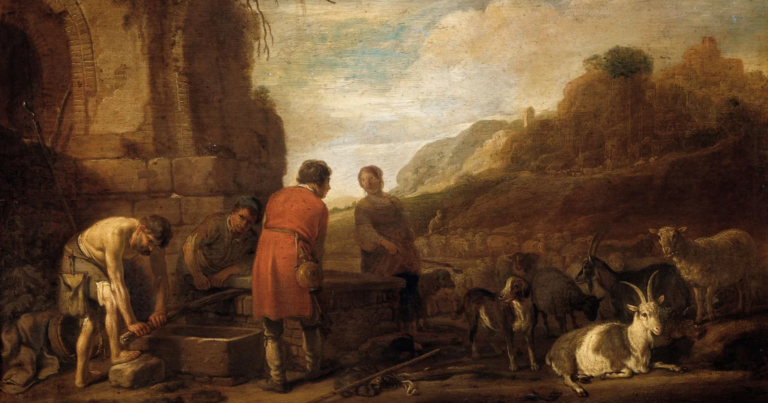“Love one another. This is the commandment that you have heard from the beginning.”
2 John 1:6
The Second Letter of John, though brief, holds a depth that belies its length.
At its core, this epistle is a powerful reminder of the fundamental truths of Christian faith — love and truth.
Understanding the identity of John and grasping the significance of his letters can profoundly influence how we live out our faith daily.
This article will delve into the nuances of The Second Letter of John, exploring its historical context, authorship debates, and practical applications, guiding you to incorporate its timeless wisdom into your life.
Overview of 2 John
The Second Letter of John is one of seven catholic or universal letters of the New Testament of the Bible, along with the Letters of James, the First and Second Letters of St. Peter, the First and Third Letters of John, and Jude.
These letters are so called because they are addressed to the universal Church in general, and not to a specific community such as, for example, the Philippians.
The Second Letter of St. John is similar in style and content to the Gospel of John and the First Letter of John, which attests to its authenticity.
The thing that makes Third John different is that it shows the inner workings of the Church during its difficult beginning.
Here, the term “elect lady” refers to a specific Church community.
John, “the ancient,” encourages the members of the church community to show their Christianity by adhering to the commandment of mutual love and the historical truth about Jesus, namely, that He is the Word made Flesh.
As First John, he calls those who do not acknowledge that Jesus Christ is the Word made flesh “the deceitful one and the antichrist” (2 John 7).
Authorship and context
John, referred to as “the elder” or “the ancient,” is traditionally considered the author of this letter.
He writes to a church community he affectionately calls “the elect lady,” symbolizing a collective group rather than an individual.
The letter comes from a time when the early Church was grappling with internal conflicts and the threat of false teachings.
By encouraging adherence to the foundational truth of Jesus as the Word made Flesh and advocating for love as the hallmark of Christian life, the letter seeks to strengthen the community’s resolve.
5 key themes from 2 John explored
1) Universal love and truth
The Second Letter of John deeply embeds the principle of universal love and the pursuit of truth within its core themes.
This epistle communicates a clear and compelling directive to the early Christian community and, by extension, to all believers.
That’s how it emphasizes the necessity of mutual love as a reflection of one’s faith in Jesus Christ, the Word made Flesh.
John’s message transcends the boundaries of his time, offering a timeless reminder that true Christian living is inherently linked to how we embody love and uphold the truth in our interactions.
It’s a raw and honest call to action, urging us to examine our lives through the lens of this fundamental commandment.
So, how do we apply this?
Simply by ensuring our love is not just a word we say but a truth we live out every single day.
2) Warning against heretics
“For many seducers are gone out into the world, who confess not that Jesus Christ is come in the flesh: this is a seducer and an antichrist.”
2 John 7
The Second Letter of John also serves as a stern warning against heretics and deceivers who deny the fundamental truth of Jesus Christ as the incarnate Word.
John characterizes these individuals as antichrists and seducers, highlighting the danger they pose to the Christian community.
This part of the letter underscores the importance of doctrinal purity and the necessity of remaining steadfast in the teachings of Christ.
- John advises vigilance and discernment, cautioning believers not to lose the rewards of their faith by being led astray.
- He emphasizes that anyone who does not continue in the doctrine of Christ does not have God.
That way, he shows the intrinsic link between correct belief and divine fellowship.
3) Doctrine and relationship
Next, John places a strong emphasis on the link between doctrine and our relationship with God.
He makes it clear: holding firm to the teachings of Christ is crucial for maintaining a connection with the Father and the Son.
However, this isn’t about following rules for the sake of it. Instead, he wants us to understand that our faith and the quality of our spiritual relationships are built on these truths.
In simple terms, when we deviate from teachings, we risk severing our bond with God.
So, what should we do?
Keep the doctrine close, ensuring it guides our lives and choices, reinforcing our relationship with God. This way, our faith remains strong and our spiritual connections deep and meaningful.
4) Being hospitable
What’s more, the concept of hospitality gets a nuanced treatment in this letter.
While hospitality is a valued virtue, John advises caution in its application, especially concerning those who bring teachings contrary to Christ’s.
Yes, the message is not to close our doors to everyone but to discern who we are welcoming into our lives and homes.
The caution against saying “God speed” to false teachers is a call for discernment in our interactions. It’s about protecting the integrity of our faith and ensuring we don’t inadvertently support or spread misleading doctrines.
This might prompt us to reflect on our actions:
- How do we balance Christian kindness with discernment?
- Are we inadvertently supporting those who undermine the truth of Christ?
These questions encourage readers to think critically about their approach to hospitality and support within their spiritual communities.
5) Embracing truth and charity
The core message of the Second Letter of John deeply intertwines with the virtues of truth and charity.
John’s opening greetings and blessings to the elect lady and her children are not merely polite formalities but are imbued with theological significance.
He emphasizes that these virtues — truth and charity — come directly from God the Father and Jesus Christ.
- Truth, in John’s epistle, is not just a concept but a living presence that dwells within believers and binds them together. It is both a gift and a responsibility, guiding the community in faith and practice.
- Charity, or love, as articulated by John, is an active commitment to God’s commandments. It’s an expression of faith in action, demonstrating the believers’ adherence to the teachings of Jesus.
Thus, John’s letter serves as a reminder that living a Christian life is not about adhering to abstract principles but about embodying the truth of Jesus Christ through acts of love.
6) The role of communication
The conclusion of The Second Letter of John emphasizes personal connection and communication:
“I would not by paper and ink: for I hope that I shall be with you, and speak face to face” (2 John 12).
Despite the brevity of his letter, John expresses a deep desire for face-to-face interaction to fully share in the joy with his readers.
In an age where written words were precious and scarce, this longing highlights the value placed on personal relationships in nurturing faith.
It’s a straightforward reminder of the importance of direct engagement in building and sustaining spiritual communities.
Takeaway: Your next steps in faith
The exploration of the Second Letter of John illuminates the pivotal themes of love, truth, and vigilance against deceit — core tenets that support a robust Christian life.
This letter, while concise, provides profound guidance for believers seeking to deepen their understanding and application of biblical teachings.
For those drawn to The Second Letter of John, the call to action is clear:
- Engage with Scripture continuously, allowing the Holy Spirit to reveal deeper insights and applications for daily living.
- Practice discernment by examining teachings and influences against the truth of Christ’s incarnation and commandments.
- Cultivate a community that values truth, supports mutual growth in faith, and embodies the commandment to love one another.
This letter’s timeless wisdom encourages believers to fortify their faith, ensuring it is deeply rooted in love and truth.
By doing so, Christians not only safeguard their spiritual journey but also contribute to the building up of the universal Church — reflecting the light of Christ in a world marred by deception.














